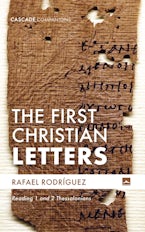Reclaiming the Radical Economic Message of Luke
Imprint: Pickwick Publications
262 Pages, 6.00 x 9.00 x 0.52 in
- Paperback
- 9781666733396
- Published: May 2022
$35.00 / £31.00 / AU$55.00
BuyOther Retailers:
No canonical Gospel is more concerned with wealth and poverty than Luke. A centuries-long debate rages over just how revolutionary Luke's message is. This book seeks to recover Luke's radical economic message, to place it in its ancient context, and to tease out its prophetic implications for today. Luke has a radical message of good news for the poor and resistance to wealth. God is shown to favor the poor, championing their struggle for justice while condemning the rich and recommending a sweeping disposal of wealth for the benefit of the poor. This represents a distinct break from the ethics of the Roman Empire and a profound challenge to modern economic systems. Generations of interpreters have worked to file down Luke's sharp edges, from scribes copying ancient manuscripts, to early Christian authors, to contemporary scholars. Such domestication disfigures the gospel, silencing its critique of an economic system whose unremitting drive for profit and economic growth continues to widen the gap between rich and poor while threatening life-altering, environmental change. It is time to reclaim the bracing, prophetic call of Luke's economic message that warns against the destructive power of wealth and insists on justice for the poor and marginalized.
David D. M. King is a United Methodist pastor and graduate of the Joint Doctoral Program in Religious and Theological Studies at University of Denver and Iliff School of Theology.
“King maintains that the economic message about wealth and poverty in Luke’s Gospel was radical in the late first and early second centuries and remains radical for today. While his is a closely detailed exegetical analysis, it is also a work of constructive theology, making it doubly valuable. Subsequent scholars of wealth and poverty in Luke will surely need to acknowledge their debt to his sedulous incorporation of cutting-edge postcolonial and liberationist interpretations from the margins.”
—Gregory Allen Robbins, University of Denver
“King offers a comprehensive reappraisal of Luke that is itself radical. . . . King argues not only that Luke’s Gospel is faithful to Jesus’ ministry to the poor, but he demonstrates that Luke confronts economic injustice in ways that go well beyond traditions of Jesus’ preaching. King’s recasting of Luke’s Gospel is not a simple historical reevaluation of the text, it is a contemporary prophetic interpretation of Scripture. Let those who have ears to hear, hear.”
—Pamela Eisenbaum, Iliff School of Theology











